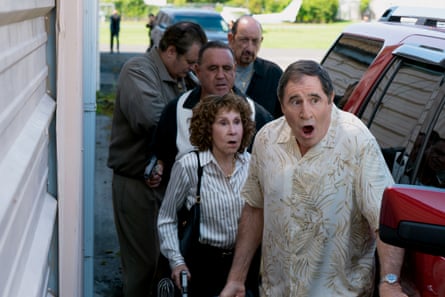This tribute to case-of-the week crime dramas is so nearly a brilliant TV show. Starring Natasha Lyonne (Orange Is the New Black, Russian Doll) as Charlie Cale, a woman with a foolproof ability to tell truth from falsehood, the series follows in the footsteps of classic story-of-the-week crime dramas; each episode features a tranche of excellent guest stars and a freshly covered-up misdeed for our thoroughly charming citizen-detective to uncover. With her gravelly-chipmunk New York tones – or “voice like a rusty clarinet”, as one character has it – Lyonne ensures Cale is an idiosyncratically charismatic protagonist you can really get behind. She’s cool: her catchphrase is “bullshit” and her aesthetic is 1970s-hued indie sleaze; shades, spray-on jeans, biker boots, shrunken T-shirts, wild, matted hair. She’s chaotically good, too: mischievous enough to bend the rules but essentially golden-hearted, in possession of an old-timey garrulousness and an inability to let things lie. What’s not to love?
The mysteries themselves, mainly. Most episodes of Poker Face – which was created by Knives Out director Rian Johnson, although he is not a credited writer on this second season – involve a 10ish-minute Cale-free opening, during which the viewer bears witness to a crime, usually a murder. Afterwards, we discover how our hero came to be acquainted with both the perpetrators and victims. Since the end of the very first episode, Cale has been on the run: first from a shady casino boss who wanted her dead (she was involved in the destruction of his business and the suicide of his son); then, as of the start of this new season, another shady casino boss who wants to exploit her lie-detection skills. To evade capture, she zigzags across the States at random – and into the path of a host of inadvertent murderers.
As a setup, it’s knowingly ludicrous. Yet while Poker Face’s crimes are all archly odd – variously involving pilfered breast milk, clearly robotic alligators and five sisters all played by Cynthia Erivo – they are not quite wacky enough to qualify as pastiches of the vintage murder mysteries (Columbo, Magnum, PI, Murder, She Wrote) they pay homage to. The action is amusing rather than laugh out loud (why cast the outrageously hilarious Patti Harrison then not give her a single funny line?), yet too camply stylised to be dramatically absorbing either.
This would be less of a problem if said mysteries were clever or complex or surprising enough to work on their own terms. Unfortunately, they range only from tediously predictable to moderately diverting. Like Columbo, Poker Face is not a whodunnit or a whydunnit, but a “howcatchem” – we watch to see how the protagonist unravels the riddle. This means no shocks or twists for the audience, something viewers have grown to expect from other anthology-type series like Black Mirror and Inside No 9. Again, this lack of jeopardy would be fine if the solving was done artfully or ingeniously. But Cale’s approach only draws partially on her mind-reading talents – which, as she points out, are limited to spotting dishonesty rather than unearthing truth – and mainly hinges on an ability to pick up on vague clues: her final exposé is often a result of a sudden realisation that has nothing to do with her special powers.

Despite the variety of settings – a gym, a baseball stadium, a cabaret theatre, a police awards ceremony – and a multitude of high-profile guests (among them Katie Holmes, Awkwafina, John Mulaney, Melanie Lynskey, Steve Buscemi and Alia Shawkat, enjoying herself immensely), the mechanics can feel repetitive. Cale is often some kind of waitress in the venue where the crime took place; she needs cash-in-hand jobs to survive her itinerant lifestyle. There are multiple instances of somebody spiking a rival, and numerous plots involve people demanding hush money to keep schtum. The dampening effect of this formulaic approach is brought into sharp focus by the straightforwardly great episodes that don’t follow it: one gratifyingly unpredictable instalment involving Cale’s apprehension by crime boss Beatrix Hasp (a fantastic Rhea Perlman), who demands she help expunge a rat (or is it a mole? Or perhaps a snake?) from her gang of heavies before they attempt to flee the country, and another about a group of old-school con artists that blessedly doesn’t spell out its final denouement in advance.
These are the episodes that are the most frustrating, because they prove how well Poker Face could work. More intricately plotted murders, more inspired crime-solving and a few more surprises for the audience, and we would have that rare thing: a gripping and genuinely fun detective thriller with an enchanting, one-of-a-kind guide.

.png) 4 hours ago
4
4 hours ago
4













































